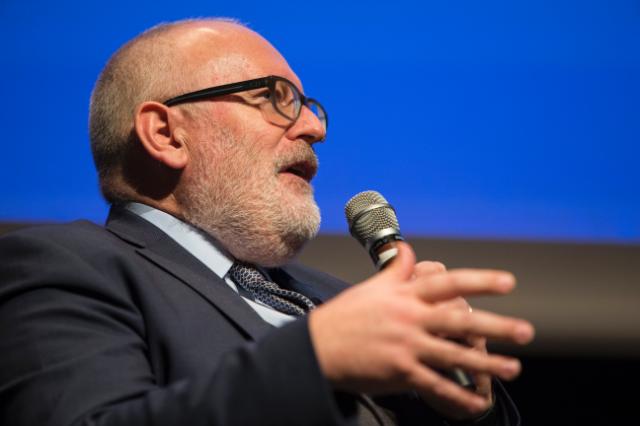The European Commission will not shy away from consequences on Maltese authorities if and when the mastermind behind the crime is uncovered, the European Commission’s first vice-president Frans Timmermans said.
Speaking at a press conference on Monday, Timmermans said “we need to come to full disclosure of what has happened, why this happened and who is responsible. And we will not shy away from consequences if we uncover who is responsible, even if that would have other implications pertaining to authorities in Malta or other economic structures.”
Timmermans said everything that the Daphne Project is bringing to the table will be ascertained by the European Commission “and if we see scope for the Commission to act on that information we will certainly do so but we need to have a legal instrument to do that, we need to be competent in that area. But I want to assure you that if anything comes out of this that would warrant us to act we will not refrain from acting, we will act.”
While reassuring that the European Commission will pursue this matter, Timmermans said “this investigation is not just about bringing to justice the people who’ve actually made the bomb and made the explosion that killed Daphne. This is also about uncovering who gave the order to do that, who is behind all of this and what the reason for all of this is. And as far as we are concerned we’ll keep on pushing the Maltese authorities, no stone should remain unturned in this issue.”
During Monday’s press conference on the commission’s proposal concerning the protection of whistleblowers, European Commissioner for Justice, Vera Jourova, said she will be visiting Malta shortly to find out more about the investigation into Caruana Galizia’s assassination.
While saying that the commission opened infringement proceedings over Malta’s failure to transpose the anti-money laundering directive, Jourova said “we have several other things to talk about with Maltese authorities.”
Jourova said she is planning to visit Malta in May or June of this year where she will among others discuss the need to strengthen the anti-money laundering agency, the FIAU, and “enquire about the state of play of the investigation of the murder of Daphne Caruana Galizia.”
She will also be discussing the citizenship-for-cash scheme which Timmermans insisted should have a clear link between applicants and Malta.
New EU whistleblower law
The European Commission is proposing a new law to strengthen whistleblower protection across the EU.
The commission said recent scandals such as Dieselgate, Luxleaks, the Panama Papers or the ongoing Cambridge Analytica revelations show that whistleblowers can play an important role in uncovering unlawful activities that damage the public interest and the welfare of our citizens and society.
Timmermans said recent scandals may never have come to light if insiders hadn’t had the courage to speak out.
“But those who did took enormous risks. So if we better protect whistleblowers, we can better detect and prevent harm to the public interest such as fraud, corruption, corporate tax avoidance or damage to people’s health and the environment. There should be no punishment for doing the right thing,” he said.
In addition, Timmermans said the proposals also protect those who act as sources for investigative journalists, helping to ensure that freedom of expression and freedom of the media are defended in Europe.
The new proposal also guarantees a high level of protection for whistleblowers who report breaches of EU law by setting new, EU-wide standards. The new law will establish safe channels for reporting both within an organisation and to public authorities.
Timmermans said it will also protect whistleblowers against dismissal, demotion and other forms of retaliation and require national authorities to inform citizens and provide training for public authorities on how to deal with whistleblowers.













